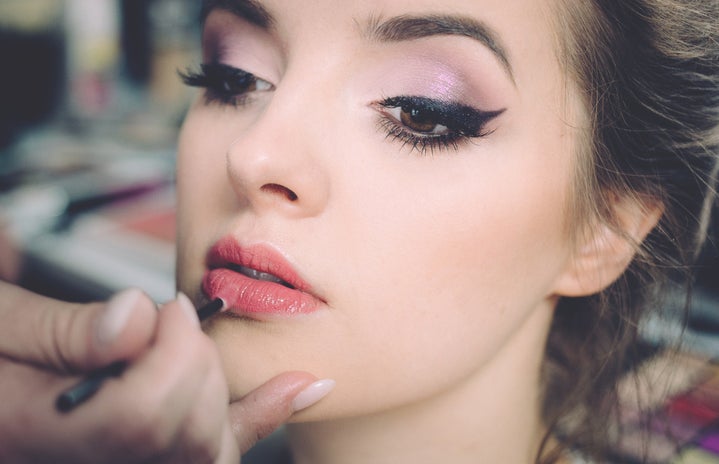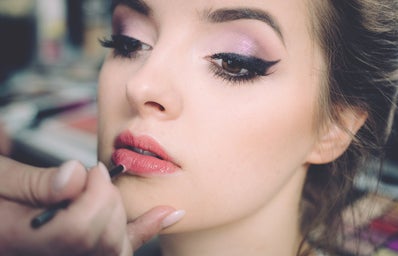The new year brings around a new round of resolutions—some more achievable than others (sorry, gym: looks like it won’t be this year). And while I wholeheartedly encourage you to go for all your goals and get that gym membership, I can’t give you advice on most resolutions or how to keep them. But here’s one resolution for your consideration: getting better at skin care. I hear lots of friends say they want a better skin care routine, and let me tell you, if you want to feel like a “real adult” who “can function,” somehow, even a simple, good skin care routine can go a long way. So if you like to use consumerism as a signifier of your adulthood, here are some tips to help you along the way.
Get a basic skin care routine
This may seem obvious, but if you’re an absolute beginner, it can be daunting looking through the skin care aisle, especially with the tricky marketing schemes and hard-to-pronounce ingredients. Just to start, go for a cleanser (a milky one usually works for most skin types), a toner (alcohol-free, please), and a moisturizer (don’t be scared of oils). And you don’t have to spend all your money at Sephora, either; there are lots of great drugstore brands that do the trick.
Try not to scrub your face off
I totally get the appeal of using a rough scrub on your face: your skin generally feels extra clean and smooth after, your pores free and able to live their best life. I won’t say you need to stop using them completely, but I would discourage physical (gritty) exfoliators. For one, they can cause microtears in your skin, which can lead to inflammation, and can also cause blood vessels under your skin to break. One of the most popular face scrub companies, St. Ives, had a class-action lawsuit filed against it for doing so much damage to the skin. Exfoliation it still a good idea, though; just look for a chemical exfoliator instead.
Make friends with oils
Since hitting puberty and dealing with our oil production going into overdrive, we’ve been bombarded with products and ads for “oil-free” and “drying” products, as though natural oils are the root of all your problems. It’s no wonder that people still avoid oil in their products, but oil can be great for your skin, even if you think your skin is oily! Oftentimes, oil-free products can cause a bigger problem than a solution. Many of them have ingredients and properties that strip your skin of all its natural oils, causing skin to get dehydrated and then overproduce oil to compensate, which means you see your skin overproducing oil and continue to use harsh, drying products. It’s a vicious cycle, see? Of course, not all oil is great for your skin. Some can be highly comedogenic (pore-clogging), like coconut oil, but many have tons of vitamins and nutrients that are good for your skin. I’ve known a few people with “oily” skin who started using oil after being scared of it for years, and their skin improved hugely.
Don’t rely on makeup wipes
I know makeup wipes can be super helpful for things like camping, music festivals, or coming home from a night out. But other than the convenience, they won’t do much for you. They combine both an often harsh textured wipe with drying chemicals and don’t get all of your makeup off, even after using multiple wipes. They’re also an avoidable source of waste. For both your skin and the environment, try to keep them out of your routine when possible.
Be careful of skin care “hacks”
I’m a big fan of being able to make your own products or find better products for cheaper, but be careful of putting things on your face that aren’t meant to be. These could be food products that could be irritating in a homemade mask, or household products like toothpaste for drying out pimples. The toothpaste trick has been around for ages, but with acne, toothpaste dries out the top layer without healing the infection underneath, essentially only making it look a bit better for a short amount of time. In addition, toothpaste can be gritty and irritating, or have harmful bleaching properties. Not what we want for our skin!
Use a toner
I never realized how much toner could do until I started using it. After cleansing, your skin can be stripped of its oils and/or the pH can get out of the optimal range. Usually, it feels like your skin is stretched too tightly. Toner helps to add moisture back into the skin and raise the pH back. It’s like if you were making toast with jam: you could just plop the jam on the toast, but if you wanted your toast to be less dry and it all to work together best, you would put butter in between them. You know, butter that has moisturizing, pH-balancing, anti-redness properties.
There is lots more to creating a skin care routine that works well for you, and I’m no professional— just an amateur who reads a lot online. If something works well or not well for you, you know your skin best. But these are some of the easiest and quickest fixes that will work for most skin types and budgets. In the end, skin care is for many a big part of self-care, and taking the time every morning and/or evening to do something for yourself can provide some much needed downtime. “Adulting” is tough, but it’s easier once you’ve cleansed, toned, and moisturized.


